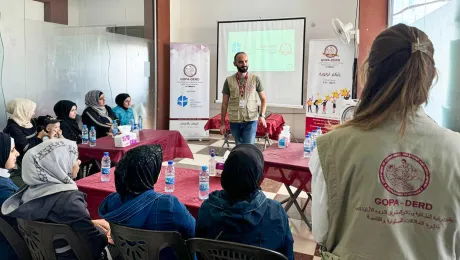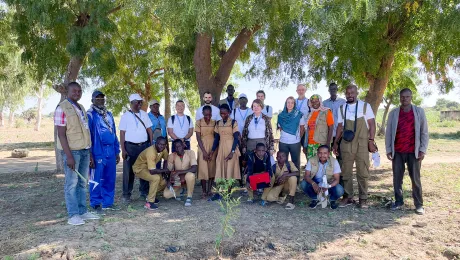To fulfill our vision and mandate in ever-changing and increasingly more competitive and insecure environments, LWF World Service is committed to having systems and practices that meet the highest of standards. We prioritize effective leadership and change management processes.
We commit sufficient resources to these priorities, creating a shared vision among our staff, developing measurable plans, and achieving some quick results in order to build momentum. We also invest in building technical capacity to implement our operations according to our three programmatic areas.
The nine areas of work outlined below are equally important and not listed in any particular order of priority.

Leadership staff from Lutheran World Federation World Service country programs met with the Communion Office colleagues in Geneva (Switzerland), in May 2019. Every year, LWF World Service gathers country directors, emergency team leaders, regional coordinators and other staff to discuss critical issues related to programmatic and managerial work. Photo: Albin Hillert/LWF
Systems and Practices for Quality Programming
- Aligned Support Structures and Systems ¶
- Resource Mobilization and Sustainable Funding ¶
- Robust Financial Management ¶
- Intentional Relations Management ¶
- Quality and Accountability ¶
- Safety and Security ¶
- Knowledge Management and Learning ¶
- Investing in people ¶
- Green Infrastructure ¶
World Service operates a decentralized model with country programs diverse in scale, size, nature, and context. The global support structures and systems (which include a degree of remote management) need to ensure that the necessary support, control, risk management, and compliance systems are in place across the organization. During this strategic period, more and more systems and processes will be brought online.
This new digital infrastructure will ensure that the different units and teams have systems that are aligned and will be up-to-date and user-friendly.
The necessary staff training will be carried out. Cost effective systems will be ensured through the creation of digital hubs of excellence in specific regions, with the necessary resources, knowledge, and skills to manage and disseminate the relevant information.
World Service builds on the strategic funding diversification established during its 2013–2018 strategic period. There will be an emphasis on cost effectiveness and value for money. This will include promoting both good stewardship of resources and more effective negotiation with donors to cover core support costs. Donor confidence, donor consolidation, and donor diversification are three key elements of sustainable funding.
We use modern systems to control and monitor financial risks and use of resources with a clear focus on achieving the best value for money. We regularly evaluate spending decisions in order to ensure resources are put to best use across the organization. We will develop tools and models to guarantee effective cost recovery, accountability, compliance, and audits. We align and standardize procurement processes and invest in technology to simplify business processes, increase virtual working, achieve higher levels of standardization, and faster data processing and financial reporting.
Strategically building relations with key actors is vital for our operations. Ensuring that such relations are adequately resourced and that dialogue with partners is serious and credible are keys to success. Accountability, transparency, and visibility are all elements that need to be promoted and well managed with partners at all levels.
Building and managing these relationships needs time, energy, proactivity and effective networking. Key roles and responsibilities at all levels will be identified, assigned, and resourced.
Continuing to set high quality and accountability standards is a top priority for World Service. Accountability to affected populations and transparency at all levels means that we continue to develop and ensure that the necessary systems, infrastructure, and staff skills and knowledge are in place to fulfill this commitment. We prioritize the placement of quality management teams and staffing in our country program operations. We also continue to develop a robust program monitoring and evaluation system with well-defined results and quality indicators that inform programs of their progress. In addition, we ensure that the necessary mechanisms for both internal as well as external accountability are robust and proactively and continually improved, including CHS compliance, effective complaints handling, and investigations.
From a duty-of-care perspective, we will build security awareness and management capacity in order to be better equipped to implement programs in insecure environments. The fast-changing security context has had a negative impact on humanitarian and development work, and requires improved security risk management in order to identify threats that could affect personnel, assets, operations, and reputation.
Through an effective security management system, we are now better able to identify what the risks are, what mitigation strategies and measures and incident management responses are needed, and how risk levels for World Service can reduce the impact and likelihood of an undesirable event.
We are a learning organization committed to constantly improving the effectiveness and coherence of our work. Knowledge management comprises a range of practices used to identify, create, represent, distribute, and enable the adoption of insights and experiences. Building an organizational framework and developing tools that promote the retention of knowledge, experiences, and lessons learned is a top priority. In the context of high staff turnover, World Service will strive for continuous improvement, the retention of knowledge as a strategic asset, and active sharing of knowledge across the organization.
Having the right staff, with the right skills, and the necessary support systems in place, is crucial to fulfilling our objectives, mandate, and vision. We have many highly motivated staff, and we are committed to retaining them and providing them with learning opportunities to flourish and grow. We are committed to seeking gender and age balance and equity at all levels of staffing, particularly in managerial positions. In particular, we seek to develop female and young talent. Investment in people management will shape our future leaders, support staff working under stressful circumstances, and ensure talent management and career development.
World Service will align its work with the new LWF policy developed to implement the LWF Assembly’s most recent resolutions on climate change.
Calling for climate justice, sustainability, and a low carbon footprint requires us to “green” our infrastructure development and building-maintenance.
Investments into improved energy efficiency, the enhanced use of renewable energies, water saving and protection measures, and improved waste management are not only necessary measures to protect our environment and climate, but also have a huge potential to reduce our mid- and longterm costs, and hence will contribute to economic sustainability of our operations.
Contact
Get Involved
Share with us your stories, photographs and insights using the #LWF




